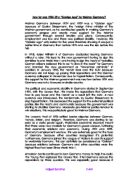A new constitution was set up, which was to decide how the new Weimar system would work. It stated that a president would be elected every seven years, and he would have the power to appoint and dismiss chancellors, and would be a supreme commander of the military. The president would also be able to rule by emergency decree, article 48, where the president could pass laws without consultation with the Reichstag. Two parliamentary institutions were set up, the Reichstrat, similar to the House of Lords and the Reichstag, similar to the House of Commons. The Reichstag contained deputies who were elected every four years, by proportional representation. The Reichstrat had less power and contained delegates nominated by parliaments of the federal states.
(b) Between the years of 1918 and 1923, Germany went through a serious depression, in which the stability of the government was in doubt. This was shown by attempted revolutions, such as the Spartacists putsch in 1919, from the left wing, and the Kapp Putsch and the Munich Putsch from the right wing. This obviously meant that there was unrest in Germany and many people disliked the new Weimar regime.
The Weimar regime got off to a bad start, as the harsh Treaty of Versailles was imposed on Germany. Many Germans felt frustrated by the harsh terms, and the government was not popular for signing it. The treaty also led to ideas from right wing groups of the "Stab in the back theory", where they blamed the government for signing the treaty and not continuing the war. So from an early start, Weimar lacked support from the public, which was not good for the future stability of the government, as people may start turning to extreme groups. Although the chancellor Scheidemann tried to disassociate the government with the signing of the treaty by resigning, Germany was eventually forced to sign it.
The treaty led to many difficulties in the following years, Germany had lost 13% of her territory, and was split in two, but the main problem to the government was the reparations. As Germany became unable to pay, French troops moved into the Ruhr, and industry was hit, also reparations were a cause of hyperinflation. This led to many people losing savings, and poverty was very high, and living standards dropped dramatically. This obviously led to people becoming dissatisfied with Weimar democracy, and some extreme groups were thriving on support. The term of the treaty that the army size should be 100,000 men also led to political instability. It was decided that these 100,000 men should be fully trained soldiers and so the Freikorps, a separate group, was to be disbanded. This led to the Kapp Putsch in 1920, which in turn led to Weimar having to get help from the left wing in order to suppress it. This showed how much Weimar was under threat, as it relied on other groups to help stop a revolution. A similar event had happened a year earlier in 1919, but this time it was the left wing Spartacists who attempted the revolution, and the Freikorps who suppressed it.
The system of Weimar was not perfect, it was the first time that Germany had been a democracy, and Weimar known as an "experiment." The way that governments were elected and chancellors appointed was flawed. A system of proportional representation was used at elections, which always led to coalition governments as no party ever got a majority. This meant that governments changed very frequently, as parties within the coalition disagreed, and pulled out, so a new government would have to take over. The large number of changes in government shows how unstable the system was, as there were a lot of events which happened, which resulted in the fall of another government. International attitudes towards Germany did not help Weimar, because between 1918 and 1923, the Allies still did not trust Germany, even though it was now a democracy. This was shown by the Treaty of Versailles and the French invasion of the Ruhr, which caused Germany to be in huge economic difficulties, and may have been a cause of the attempted revolutions.
Overall, it was the Treaty of Versailles which was the main cause of political instability, as the harsh terms left Germany crippled and many people wanting revenge. people blamed the government for signing the Treaty, which was not good for the future of Weimar, as many people would turn to more extreme governments. Other factors were to blame for political problems, such as the system, but it was the Allied nations who did more damage to Weimar, setting the harsh Treaty of Versailles, invading the Ruhr. This put Germany in economic trouble and left many people on the streets, in poverty, which obviously led to a lack in confidence for the Weimar regime, which is why revolutions were attempted, and the Germany was generally politically unstable.







